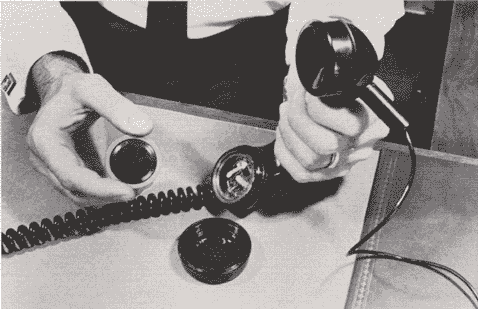Photo Tag: The extent of the business in snooping devices is indicated by the growth in contrivances to detect wiretaps and "bugs". Some merely warn the intended victim, while others jam or scramble the snooping. This telephone de-bugging meter discovers any transmitter (bug) in the phone or in the lines leading to it. De-bugging devices are bought mostly by business executives who suspect espionage by competitors. (AP Photo/Robert Kradin) (more)
It was never unusual for news reporters to get the facts wrong when reporting on business espionage, bugging or general electronic snooping. It still isn't unusual. The photo actually shows how a carbon microphone from the common phone of the day could easily be replaced by one which also transmitted the voice via radio.
Due to the simple installation, it was generally referred to as a "drop-in bug". To the untrained eye, both looked legitimate, but your ear could tell! The internal carbon granules inside the microphone sounded like sand when shaken. In order to build the bug inside the housing, the carbon had to be emptied out to allow space for the electronics and micro-mic. Those bugged mics were silent when shaken.
Another photo from the same era, shows two ways to tap a phone: the drop-in bug, and the big suction cup induction coil near the earpiece. Both seem crude by today's standards.
Most modern
handsets are sealed units. Dropping anything in them is problematic.
There are still a few, however, that are screwed together.
 Here are two
examples of what you shouldn't see if you open one of these...
Here are two
examples of what you shouldn't see if you open one of these...
Inspecting today's telephones require more than a trained eye, because there may not be anything to see.
Conversations from VoIP phones travel as computer bits which may be collected far from the phone instrument. In fact, some VoIP phones transmit room audio even when they are supposedly hung up.
Other business telephone systems have many eavesdropper-friendly features built right into them, no extra hardware needed. Just program the features correctly and listen-in.
Think your phone system is bugged or tapped? Give me a call. ~Kevin











































